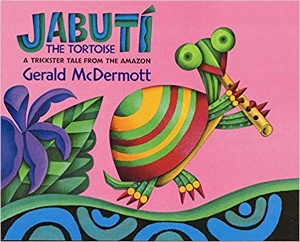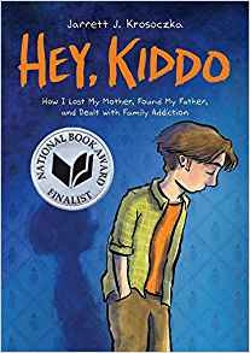
The Horn Book website has lots of material of interest to teachers. Here are some areas to explore. And follow us on Twitter: #lollysclass
|
Interviews with authors and illustrators Recommended books -- reviews and themed book lists |
School -- reading in school, author visits, and more Suggestion box: what else to you want to see in Lolly's Classroom? |
Let Struggling Readers Read What They Want
I worked as a tutor for over five years, helping students learn to decode words and comprehend what they read. Many of the students fell either on the dyslexic or autistic spectrums, and all had dealt with difficulty and discouragement with reading in the past. This meant I regularly faced a slew of adamantly reluctant readers. Whenever possible, we gave them books that excited their interests to smooth the transition from lessons to context.
I worked as a tutor for over five years, helping students learn to decode words and comprehend what they read. Many of the students fell either on the dyslexic or autistic spectrums, and all had dealt with difficulty and discouragement with reading in the past. This meant I regularly faced a slew of adamantly reluctant readers. Whenever possible, we gave them books that excited their interests to smooth the transition from lessons to context.
 There was one older elementary school student who had almost no confidence in school largely due to social pressures and because she was so far behind her peers. Being a clever child, she knew she was behind. After a number of tutoring sessions, she was ready to apply her newfound skills. But when we placed a book in front of her, she immediately swiped it off the table. We tried a different title, with the same result. She knew these books were “easier” than what she’d been reading in school (since we worked to build up to grade level), but, of course, she had not magically gained confidence in the meantime. We had to find a book she’d be willing to try. This girl happened to have a pet Russian tortoise at home, and loved all things related to tortoises (not to be confused with turtles!). We found a picture book called Jabutí the Tortoise: A Trickster Tale from the Amazon by Gerald McDermott; when we gave her this book, encouraging her and aiding her when appropriate, she read the whole thing within a few minutes. Success!
There was one older elementary school student who had almost no confidence in school largely due to social pressures and because she was so far behind her peers. Being a clever child, she knew she was behind. After a number of tutoring sessions, she was ready to apply her newfound skills. But when we placed a book in front of her, she immediately swiped it off the table. We tried a different title, with the same result. She knew these books were “easier” than what she’d been reading in school (since we worked to build up to grade level), but, of course, she had not magically gained confidence in the meantime. We had to find a book she’d be willing to try. This girl happened to have a pet Russian tortoise at home, and loved all things related to tortoises (not to be confused with turtles!). We found a picture book called Jabutí the Tortoise: A Trickster Tale from the Amazon by Gerald McDermott; when we gave her this book, encouraging her and aiding her when appropriate, she read the whole thing within a few minutes. Success!
Whether trying to keep their minds stimulated during the summer or for independent reading during the school year, dealing with reluctant readers is a struggle many adults know well. To save everyone some stress, the fight doesn’t need to be about what they’re reading, just that they do it. Here are some categories (with plenty of overlap) to encourage middle schoolers and high schoolers to read, as well as quality recommendations within each.
 Graphic Novels and Comic Books
Graphic Novels and Comic Books
Comic books’ illustrations can appeal to reluctant readers, since the pages seem less intimidating. The plethora of talent being published in the graphic novel format has exploded the selection of quality books from which to choose. For starters, there’s last year’s acclaimed Hey, Kiddo [a 2019 Boston Globe-Horn Book honoree], a poignant memoir from Jarrett J. Krosoczka about absent parents and addiction. Guts, the upcoming title by Raina Telgemeier (of Smile fame), continues the author’s examination of medical issues disrupting an already hectic life. For those of the fantasy bent, great options abound. Molly Knox Ostertag’s The Witch Boy has got spells and dragons, centering a boy who wants to learn his family’s witchcraft, though traditionally reserved for women. The series is set to continue with a third installment (The Midwinter Witch) this November. Speaking of dragons, Noelle Stevenson’s Nimona is a smorgasbord of knights, humor, shapeshifters, sass, and villains. Two words: so good!
 Movie and TV Tie-Ins
Movie and TV Tie-Ins
Tie-ins to movies, television, and other popular character adaptations give readers a familiar transition between media. Disney’s continued live-action remakes of some of its popular animated features have naturally produced other marketing opportunities. For stories grounded in familiar narratives but which take the characters in new directions, seek out Beauty and the Beast: Lost in a Book and Aladdin: Far from Agrabah. There are more and more movies (and movie franchises) inspired by YA novels, such as 2019’s The Sun Is Also a Star, based on the award-winning book of the same name by Nicola Yoon, and 2018’s Love, Simon adapted from Becky Albertalli’s Simon vs. the Homo Sapiens Agenda. After reading/seeing Simon, move on to Albertalli’s Leah on the Offbeat, a companion novel featuring a secondary character from the first book. There’s an upcoming film adaptation of Eoin Colfer’s Artemis Fowl series of books, originally published between 2001 and 2012. Readers can dive from the screen right into the novels or the recent graphic novel editions.
Superhero Franchises
Similarly, superhero franchises allow readers to continue adventures across media. The DC Icons series, written by established young adult novelists, are aimed at older readers and set in the worlds of popular characters. To date, the series features Batman: Nightwalker by Marie Lu, Catwoman: Soulstealer by Sarah J. Maas, Superman: Dawnbreaker by Matt de la Peña, and Wonder Woman: Warbringer by Leigh Bardugo. Tie-ins to TV shows include The Flash trilogy by Barry Lyga and Supergirl trilogy by Jo Whittemore, both for middle-grade readers. Those more invested in the Marvel Universe can read The Cosmic Quest duology, which leads up to events in the universe-shattering film Infinity War, and Thanos: Titan Consumed to learn the backstory on the lead bad guy.
 Nonfiction
Nonfiction
Look for nonfiction books on topics typically not featured in the school curriculum. Lowey Bundy Sichol’s From an Idea to… series covers the rise of well-known modern businesses, including Disney, Nike, Google, and LEGO. Pair a family trip to a local art museum with Susie Hodge’s quirky Why Is Art Full of Naked People? Check out tell-all memoirs like British YouTuber Alex Bertie’s Trans Mission: My Quest to a Beard or the exemplary graphic novel Persepolis by Marjane Satrapi. Or read about some awesome women in A Pirate’s Life for She: Swashbuckling Women Through the Ages by Laura Sook Duncombe.
Whatever route you and your reader choose, books like these can be a key compromise to encourage reluctant readers to at least flip through the pages of a book rather than toss it across the room. Some may still need direction on choices, but don’t be afraid to let your kids read what they want to read. Loosen your ideas about what they should read, and more importantly, encourage their interests.

ALREADY A SUBSCRIBER? LOG IN
We are currently offering this content for free. Sign up now to activate your personal profile, where you can save articles for future viewing.







Add Comment :-
Be the first reader to comment.
Comment Policy:
Comment should not be empty !!!